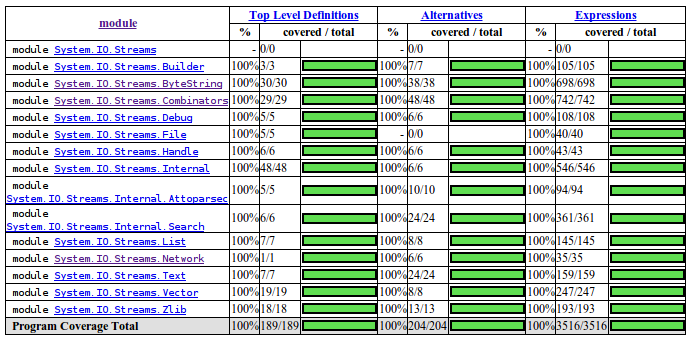After more than eight months of careful design and development, The Snap Framework team is happy to announce the first version of io-streams, a simple and easy-to-use library for doing streaming I/O in Haskell.
The io-streams library is based around two basic types, InputStream a and OutputStream a, and three fundamental I/O primitives:
-- read an item from an input stream
read :: InputStream a -> IO (Maybe a)
-- push an item back to an input stream
unRead :: a -> InputStream a -> IO ()
-- write to an output stream
write :: Maybe a -> OutputStream a -> IO ()Streams can be transformed by composition and hooked together with a large set of provided combinators:
ghci> Streams.fromList [1,2,3::Int] >>= Streams.map (*10) >>= Streams.toList
[10,20,30]Stream composition leaves the original stream accessible:
ghci> input <- Streams.fromByteString "long string"
ghci> wrapped <- Streams.takeBytes 4 input
ghci> Streams.read wrapped
Just "long"
ghci> Streams.read wrapped
Nothing
ghci> Streams.read input
Just " string"Simple types and operations in the IO monad mean straightforward and simple exception handling and resource cleanup using Haskell standard library functions like bracket.
The io-streams library comes with:
- functions to use files, handles, concurrent channels, sockets, lists, vectors, and more as streams.
- a plethora of combinators for wrapping and transforming streams, including compression and decompression using
zlib, controlling precisely how many bytes are read from or written to a stream, buffering output using bytestring builders, folds, maps, filters, zips, etc. - support for parsing from streams using attoparsec.
For first-time users, io-streams comes with an included tutorial in the System.IO.Streams.Tutorial module, written by Gabriel Gonzalez of “pipes” fame.
The io-streams library is tested on GHC 7.0, 7.2, 7.4, and 7.6, and includes an extensive test suite with 100% function, statement, and branch coverage:

Haskell program coverage report for io-streams 1.0.0.0
The io-streams library was written to serve as the I/O subsystem underpinning the next release of the Snap Framework web programming library and server. It also serves as the basis behind the excellent new http-streams HTTP client library written by Andrew Cowie, which will also be released shortly, along with the openssl-streams for interfacing HsOpenSSL with io-streams.
Frequently asked questions
Q. Why yet another library for doing streaming I/O? Aren’t iteratees/pipes/conduits enough?
A. There are two motivating differentiators that led me to write io-streams: the other libraries were too difficult to understand, and their use of continuation-passing style interacts badly with asynchronous exceptions.
Q. What is the resource-handling strategy used by io-streams?
A. In nearly all cases, resources (Sockets, Handles, etc.) are not managed directly by io-streams. You can think of an InputStream as a little state machine that you attach to an underlying resource. Instead, you can use standard Haskell exception-handling strategies like bracket to acquire resources, hand them to io-streams, perform streaming computations, and then clean up afterwards.
Since you manage resources and everything happens in a direct style in the IO monad, you can be sure that e.g. opening a temporary file halfway through a streaming computation and cleaning it up using bracket is always exception-safe.
Q. Why isn’t io-streams written in monad transformer style?
A. A couple of reasons:
- to keep the library as simple as possible. Even beginners should be able to understand and use
io-streamswithout too much trouble. - I’m coming to the conclusion in my own code that monad transformers are OK in small doses, but are often overused, especially where very large monad transformer stacks are concerned. Each level added to a monad transformer stack is a performance tax on every line of every monadic function.
I realize that this may make io-streams inappropriate for use with resources that have operations in some other monad lifted over IO; I’m more than happy with this compromise.
Acknowledgments
We would like to acknowledge the financial assistance of Erudify AG, who graciously funded some of the documentation and development of the io-streams library. Many thanks are also due to Gabriel Gonzalez, Andrew Cowie, Johan Tibell, and Bas van Dijk for their helpful discussions, contributions, and review.